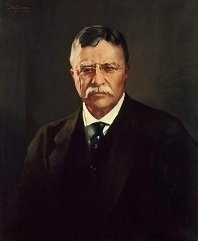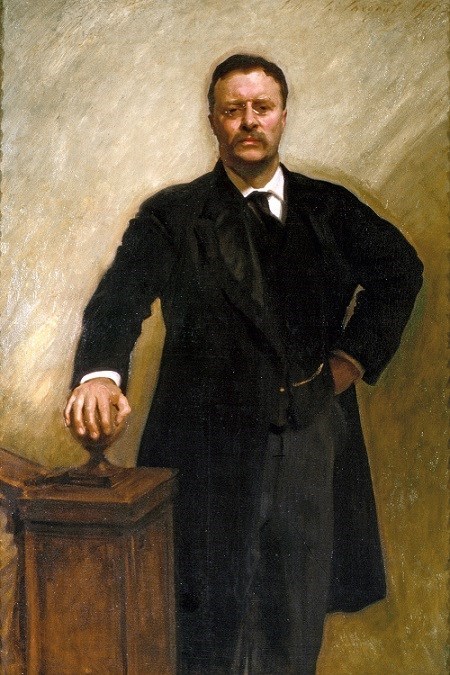 |
| (http://www.theodore-roosevelt.com/ ()) |
Champion of America: Theodore Roosevelt "With self-discipline most anything is possible" (Theodore Roosevelt). This was the personal motto he carried throughout life; it enabled him to become the national hero, the striving idealist, and the moral figure who stood up for what was right. Instead of accepting what life gave him, he reached ahead and challenged the standing institutions in a David and Goliath battle and won. He issued a new era of politics and thinking, with himself at the head of the reformist movement. His ideals are so ingrained into America that his legacy is set in stone. Theodore Roosevelt deserves his position on Mt. Rushmore among our nation's great presidents as an embedded core of our culture; his hardworking personality, his commitment to saving the American wild, and his drive for equality and social justice place him among the highest class of heroes.
 |
| (http://en.wikipedia.org/wiki/Theodore_Roosevelt (John Signer Sargent)) |
Born on October 27, 1858 in New York City to Theodore Roosevelt Sr. and Martha Bulloch, Roosevelt was a frail boy, but he worked hard to overcome his limitations (Hair). In 1886, "He married Edith Kermit Carow; they eventually had a daughter and four sons, and she became his most trusted advisor," (Contemporary Heroes). His political career began in the New York State Assembly in 1881 and was continued, "[as] a member of United States Civil Service Commission (1889-1895), [as] president of New York City's Board of Police Commissioners (1895-1897), and [as] assistant secretary of the U.S. Navy (1897-1898). He resigned the latter post when war with Spain broke out in 1898," (Hair). He commanded the First United States Volunteer Cavalry, nicknamed the "Rough Riders," and became a national hero: "...the image of Colonel Roosevelt leading a charge up San Juan Hill (in actuality, Kettle Hill) became a public symbol of this brief, victorious war," (Freidel). Afterwards, he ran for and won the governorship of New York (1898). In 1901, he ran as a progressive vice-president on the Republican ticket with William McKinley and won. His lack of any authority angered him, "But that all ended in September of 1901 when McKinley was wounded in an assassination attempt and died a week later from an infection. Suddenly, Roosevelt found himself in the White House," (Contemporary Heroes). From that point forward, he took off with a sprint, leaving his mark on the presidency and setting an example for future presidents to follow: "He renamed the executive mansion the White House and threw open its doors to entertain cowboys, prizefighters, explorers, writers, and artists," (John Milton). After his antitrust victory against Standard Oil in 1907, "The press nicknamed him 'the Trustbuster' in recognition of his well-publicized lawsuits against major corporations that he felt were monopolizing certain industries and limiting competition," (Contemporary Heroes). Later, he championed the conservation cause and made it a priority of the American people: "Roosevelt is best known for his collaboration with Pinchot in appropriating public forest lands once controlled by private interests and 'reserving' them for 'our people unborn,'" (Environmental Encyclopedia).
Theodore Roosevelt lived a life of hard work and an iron ethic; he built himself up and maintained a high level of labor. As a child, he was sickly, weak, and unconfident in himself, but he was determined to change that: "He grew determined to 'make' a powerful body, and by strenuous exercise and force of will, young Roosevelt gradually overcame most of his physical shortcomings. Shyness and fear were other weaknesses he conquered. 'There were all kinds of things of which I was afraid at first,' he later admitted in his Theodore Roosevelt: An Autobiography (1913)," (Hair). He was unsatisfied with himself, so he decided to change that through hard work. It takes incredible courage to admit your flaws and an iron will to change them; All people can look at Roosevelt as an inspiration on how to conquer their limitations. From him the American stubbornness and unwillingness to accept defeat, whether to nature, ourselves, or other humans flows. Later, when he was president, he ran on a schedule set in stone: "In a piece for McClure's, Lincoln Steffens describes a breathless day begun when the president 'darts into the breakfast-room with a cheerful hail to those already there,' then rushes to his office before the official workday starts... From 10 a.m. to 12 p.m., except on cabinet days, the second floor reception room was crowded with senators, congressmen, Army and Navy officials... At noon, the doors open to ordinary citizens, 'an overflowing stream' of people eager to see the most colorful president in their memory... At one o'clock, Roosevelt generally excused himself from the crowd for his midday shave. During the 'barber's hour,' reporters were allowed audience, permitted to question-or more likely listen-as the president expounded upon any number of subjects..." (Goodwin 285-287). Never a man to take half-measures, Roosevelt was in constant action; he successfully managed this ungodly schedule. How many other humans could keep up with this iron schedule every day and also read at least one book before breakfast? At least some can try to match his model. When everyday Americans read about their new president, they saw the birth of something in the model of Roosevelt so strong that it remains to this day: the American work ethic. His work ethic and stubbornness in the face of defeat were major factors allowing him to accomplish something greater: conservation of the wild. Roosevelt loved the American wilderness; after the death of his first wife, Alice Lee Roosevelt, and his mother, he, "spent much of the next two years on his ranch in the Badlands of Dakota Territory. There he mastered his sorrow as he lived in the saddle, driving cattle, hunting big game--he even captured an outlaw," (Freidel). Conservation was one of his top priorities, one he was focused on making a reality: "To halt the exploitation of those resources by private interests, he reclaimed waterways, waterpower sites, arid lands, and land harboring mineral, oil, and coal deposits and placed them in the public domain. He also set aside some 150 million acres of western land as national forest, set up the first of 50 federal wildlife refuges, doubled the number of parks in the national park system, and created 16 national monuments. In addition, Roosevelt called into being the first National Conservation Convention (1908), helping to spawn 41 state conservation commissions by 1910," (Contemporary Heroes). It is because of his labor that America still has great forests, mountains, and plains instead of an industrial mess, with everything marketable uprooted from the land. He was also one of the sponsors of major environmental groups; for example, on of his best friends was John Muir, founder of the Sierra Club. One of Roosevelt's greatest allies was Gifford Pinchot, who helped him protect the land: "Roosevelt is best known for his collaboration with Pinchot in appropriating public forest lands once controlled by private interests and 'reserving' them for 'our people unborn,'" (Environmental Encyclopedia). Together, they fought for conservation, established national parks, and created the U.S. Forest Service. There is one famous story of how Roosevelt and Pinchot finished creating parks and the U.S Forest Service minutes before a congressional law would have taken the authority away. It is because of their bravery that we have these national parks and forests. One of the largest impacts Theodore Roosevelt had on American culture was his focus on social justice. One of his great moments of social justice was when he, "intervened in the Anthracite Coal Strike of 1902 to come up with a fair settlement both for labor and management and protect consumers from the prospect of cold houses, schools, and hospitals," (Contemporary Heroes). In this time, it was unheard of for a Republican in this time to not immediately side against unions. Furthermore, he worked for a "fair settlement both for labor and management." He can be thanked for giving the government the ability to stop big companies from unfairly monopolizing in ways that hurt the people and preventing the rich from controlling Congress. Beyond that, he gave hope to the people; they could stand down Big Business, they had a say, and could change things. Of this, his brainchild was created: "Within the nation, President Roosevelt called for a Square Deal for both capital and labor. He saw himself as chief arbiter of conflicts between economic groups; government, he believed, should represent everyone equitably. Believing in capitalism yet convinced that big corporations were too powerful and arrogant, he began a policy of 'trust busting,'" (Hair). The "Square Deal" was a policy of government support of the people, conservation, and antitrust against 'bad" trusts. While he was unable to implement some of the more radical policies, he was able to regulate areas like food and drugs (medicine). And while he lost in the 1912 presidential race, many of his policies like national insurance, women's suffrage, regulation of businesses, and living conditions exist today as a profound part of American life.
Mark Sullivan, a free-lance journalist, observed about Theodore Roosevelt that he, "Was a new kind of man. His high spirits, his enormous capacity for work, his tirelessness, his forthrightness, his many striking qualities, gave a lift of the spirits to millions of average men,'" (Goodwin 285). As Mark Sullivan observed, Roosevelt was a great man because he could work hard for the American people, finding a drive in helping them and helping America, both saving it for posterity and protecting it's current inhabitants. Theodore Roosevelt was the rock of the nation and the rock of the progressive movement. This once scrawny man stood up against the world's Goliaths and ended up as President; behind him, reform-focused men like Robert M. La Follette Sr., who overturned the corrupt system in Wisconsin, were able to weed out corruption and help the American people. As for the American people, they felt confidence in their say in government and that their interests were being taken care of instead of oligarchs such as John D. Rockefeller (founder of Standard Oil). More than that, they found renewed faith in the American dream, and with that, the courage to stand up for their beliefs. Hero: "A person who is admired for great of brave acts," (Merriam-Webster Dictionary). Roosevelt fought for what he believed and for others. He stood down the giants and triumphed as David did over Goliath. Because of this, his ideas are core facets of our culture; there is a reason he is known as the first modern president. Because of his contributions to America and because of his influence in shaping our world, we honor him today as the Giant he became with a carving the size of his courage.
Works Cited Freidel, Frank B., and Hugh Sidey. "Theodore Roosevelt." The White House. The White House, 2006. Web. 26 Mar. 2015. Goodwin, Doris Kearns. The Bully Pulpit: Theodore Roosevelt, William Howard Taft, and the Golden Age of Journalism. New York: Simon & Schuster, 2013. 285-287 Print. Hair, William I., and Hair William I. "Theodore Roosevelt." Great Lives From History: The Twentieth Century (2008): 1.Biography Reference Center. Web. 27 Mar. 2015. John Milton Cooper, Jr. "Roosevelt, Theodore." Britannica Biographies (2012): 1. Biography Reference Center. Web. 29 Mar. 2015. "Theodore Roosevelt." Contemporary Heroes and Heroines. Vol. 3. Detroit: Gale, 1998. Biography in Context. Web. 23 Mar. 2015. "Theodore Roosevelt." Environmental Encyclopedia. Gale, 2009. Biography in Context. Web. 26 Mar. 2015. Merriam-Webster. Merriam-Webster. Merriam-Webster, n.d. Web. 15 Apr. 2015.
Page created on 4/17/2015 12:00:00 AM
Last edited 4/17/2015 12:00:00 AM
